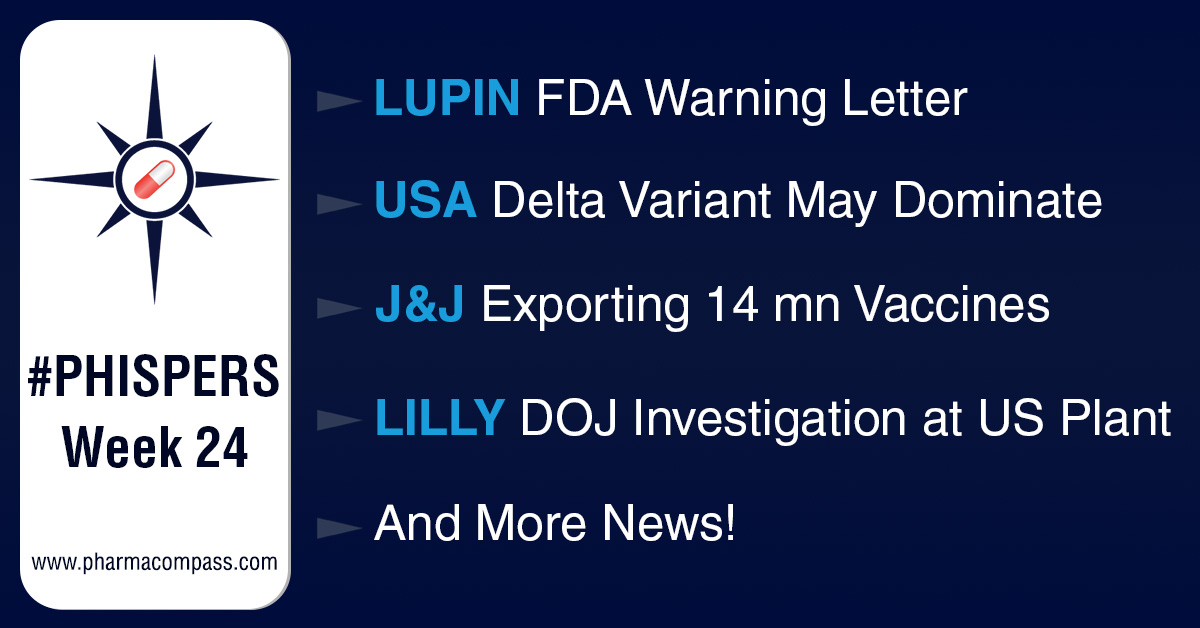
By PharmaCompass
2021-06-17
Impressions: 2,663 Article
This week, Phispers has lots of updates on antibody cocktails and the Delta variant of the SARS-CoV-2 virus that causes Covid-19. While a study undertaken by Public Health England has suggested that both the AstraZeneca and the Pfizer vaccines are highly effective at protecting against the Delta variant, experts say the strain is beginning to spread to parts of the US and may become the dominant strain there.
The US Food and Drug Administration has given a more comprehensive account of what went wrong at Emergent BioSolutions’ facility at Baltimore which led to the contamination of J&J’s single dose vaccines. The US will be exporting another 14 million doses of the jab made at the Baltimore plant, while discarding 60 million doses.
In updates on antibody therapies, there was news that Regeneron’s Covid-19 antibody cocktail reduced deaths in hospitalized patients (who have not mounted their own antibody response), while AstraZeneca’s therapy failed to prevent Covid-19 in a large trial.
Other than Covid, we bring you news that Lupin received an FDA warning letter for its Somerset facility that manufactures oral formulations, derma and controlled substances.
After fighting each other in court, Novartis has decided to hand over the joint US operations for its migraine drug — Aimovig — to Amgen. Meanwhile, the Swiss drugmaker’s experimental prostate cancer drug received breakthrough therapy designation from the FDA.
And former investors of Emisphere have filed a lawsuit over the ‘ill-timed’ sale of the company to Novo Nordisk.
Delta variant may become dominant in US; UK study shows efficacy of Astra, Pfizer jabs against it
Of late, there has been a lot of talk on the Delta variant, which was first discovered in India. The Delta variant has spread to the UK and has prompted a delay in England’s anticipated reopening. The Delta variant carries a greater risk of hospitalization, is around 60 percent more transmissible than the Alpha strain, and is said to be more resistant to vaccines.
The good news is that Public Health England data has found AstraZeneca and Pfizer-BioNTech’s Covid-19 vaccines to be ‘highly effective’ at protecting against the Delta variant.
The analysis included 14,019 cases of the Delta variant in England, of which 166 were hospitalized between April 12 and June 4. The new data, published as a pre-print, demonstrated that two doses of AstraZeneca’s vaccine are 92 percent effective against hospitalization caused by the Delta variant, with no deaths observed among vaccinated individuals.
Similarly, the Pfizer-BioNTech vaccine was found to be 96 percent effective against the Delta variant after two doses. Pfizer’s CEO and Chairman, Albert Bourla, has also expressed confidence that the jab works against the Delta variant.
“I feel quite comfortable that we cover it,” Bourla said. “We will not need a special vaccine for it. The current vaccine should cover it.”
However, there is news that the variant is beginning to spread to parts of the US and could quickly become the dominant strain there. The Delta variant is already responsible for more than 6 percent of new infections across the US. Experts, including former FDA head Scott Gottlieb, said the Delta variant is doubling every two weeks. Gottlieb said areas where people are either unvaccinated or only partially vaccinated are at the greatest risk of new outbreaks. Anthony Fauci, the US president’s chief medical adviser, has urged everyone to make sure they are fully vaccinated.
Meanwhile, there was news on Wednesday that Pfizer’s oral rheumatoid arthritis drug Xeljanz reduced death or respiratory failure in hospitalized Covid-19 patients with pneumonia in Brazil. Results of the study, which tested the drug in 289 hospitalized adult patients with the respiratory illness caused by Covid-19, were published in the New England Journal of Medicine.
Lupin receives FDA warning letter for its Somerset facility in US
Indian drugmaker Lupin said it had received a warning letter from the US Food and Drug Administration (FDA) for the company’s Somerset facility in New Jersey. This facility manufactures oral formulations, derma and controlled substances. The FDA had inspected Lupin’s Somerset site last year from September 10 to November 5 and had issued 13 observations. In 2019 too, the Somerset site had received an FDA warning letter, post a 2018 inspection.
In a statement to the stock exchanges, Lupin said it believed the warning letter won’t have any impact on the supplies or on its existing revenues. Lupin had earlier said the facility contributes less than 5 percent of its global revenues.
The company said in the statement that it is committed to addressing the concerns raised by the FDA and will work with the agency and the New Jersey District to resolve these issues at the earliest.
Lupin has been under the FDA scanner over other compliance issues as well. Three of Lupin’s facilities in India — Indore Unit-2 (that makes oral solid and ophthalmic formulations), Goa (oral solids), and Mandideep Unit-1 (Cephalosporin) — have also received FDA warning letters.
US to export 14 million J&J jabs made at Baltimore plant; to discard 60 million doses
The US Food and Drug Administration is offering a more comprehensive account of what went wrong at Emergent BioSolutions’ manufacturing plant in Baltimore, where the cross contamination of J&J and AstraZeneca Covid-19 vaccines led to the discarding of about 75 million doses.
Peter Marks, the director of the Center for Biologics Evaluation and Research (CBER), released a memo on Saturday with the details and made it clear that no vaccine manufactured at this plant has been distributed for use in the US.
On March 26, J&J had notified the FDA that they had detected AstraZeneca vaccine virus in one J&J batch. That contamination, which was later found in five batches of the J&J vaccine (or in about 60 million doses) resulted in a Form 483, and halting of production at the site.
Meanwhile, the FDA has said J&J must throw away millions of doses of its Covid-19 vaccine that were manufactured at the facility. The New York Times said that the batches being discarded amount to around 60 million doses.
However, the FDA has authorized another batch of the J&J vaccine made at Emergent’s plant. According to a Reuters report, the agency has authorized 14 million doses. Last week, the FDA had cleared around 10 million doses of the vaccine. All the J&J doses authorized from the plant to date are expected to be exported to other countries.
Lilly’s internal probe into NJ plant finds no wrongdoing; DOJ investigation to follow
On April 8, a group of Eli Lilly employees had filed an anonymous complaint alleging that an executive at its Branchburg, New Jersey, factory had altered documents required by the US Food and Drug Administration (FDA). According to the employees, the alterations were meant to downplay serious quality control problems at the plant producing Lilly’s Covid-19 antibody treatment.
A week before Lilly disclosed that the US Department of Justice (DOJ) was investigating its New Jersey factory, the Indianapolis-based drugmaker told its employees that its own inquiry, led by an outside law firm, found no evidence of wrongdoing there.
Lilly had tapped law firm Covington & Burling LLP to investigate the allegations. In the internal memo, Lilly has denied allegations that it made any false statements to the FDA.
A week after the memo was released to employees, Reuters reported that the DOJ had launched a criminal investigation focused on the Branchburg plant. The company had said it was cooperating with the DOJ probe.
While the internal probe may have given a clean chit to Lilly, the DOJ is yet to give out its verdict. According to a Reuters report, if federal prosecutors find the internal probe to be thorough, they may not press the issue much further. But if they find weaknesses in the internal investigation, they could take a tougher approach towards Lilly.
While Regeneron’s antibody therapy cuts deaths by one-fifth, Astra’s fails in large trial
Two antibody cocktails to treat Covid-19 have met with different fates — while Regeneron Pharmaceuticals’ antibody cocktail reduced deaths in hospitalized patients who have not mounted their own antibody response, AstraZeneca’s antibody therapy failed to prevent Covid-19 in a large trial.
Regeneron’s therapy, REGEN-COV, has been granted emergency use authorization for people with mild-to-moderate Covid-19 in the US. However, results from the Recovery trial — an international clinical trial to find therapies to treat Covid-19 — provide the clearest evidence of its effectiveness among hospitalized patients. The Recovery trial found that the therapy reduced by a fifth the 28-day mortality of people admitted to hospital with Covid-19 whose immune system had not mounted an antibody response (i.e., were seronegative).
The result translates into six fewer deaths for every 100 seronegative patients treated with Regeneron’s antibody therapy, researchers said. The trial also showed dexamethasone (a steroid) and Roche’s arthritis drug Actemra (tocilizumab) cut deaths in hospitalized patients.
AstraZeneca said this week that a late-stage trial failed to provide evidence that its Covid-19 antibody therapy protected people who had come in contact with an infected person. AstraZeneca’s antibody therapy — AZD7442 —was 33 percent effective in reducing the risk of people developing symptoms of Covid-19 compared with a placebo. However, that result was not statistically significant (i.e., could have been due to chance and not the therapy).
Novartis to hand over joint US operations for Aimovig to Amgen; to slash 186 jobs
With more competition in the migraine drug market, Novartis and Amgen’s joint operations in the US that make the drug Aimovig are undergoing a shakeup. This week, Swiss drugmaker Novartis said it will hand shared US business operations for the migraine drug to Amgen (including sales, marketing and medical support functions).
Novartis will retain the financial aspects of its current US collaboration with Amgen, including sharing costs and receiving royalties. Novartis will also retain the right to sell Aimovig outside of the US, except in Japan.
Novartis will also cut 186 jobs supporting Aimovig. Those include brand marketing and field sales positions that report to Novartis’ US headquarters in East Hanover, New Jersey.
Novartis and Amgen were the first to join the CGRP (short for calcitonin gene-related peptide) bandwagon with their migraine drug, Aimovig. But soon, there were tensions between the partners. In early 2019, Novartis sued Amgen for trying to inappropriately back out of their collaboration. Amgen originally had rights to the drug, but in 2015 Novartis partnered on Aimovig and spent over US$ 800 million on its development and commercialization, the lawsuit said. Amgen sued back, arguing that Novartis breached the agreement by helping bring a potential competitor to market. Novartis’ Sandoz unit had teamed up with Alder BioPharmaceuticals on a rival CGRP drug known as eptinezumab. Later, in 2019, Lundbeck snapped up eptinezumab, which is now an FDA approved drug.
Meanwhile, Novartis has received breakthrough therapy designation from the FDA for an experimental treatment for advanced castration-resistant prostate cancer. Novartis had acquired the therapy through the US$ 2.1 billion acquisition of Endocyte three years back. The FDA breakthrough designation helps expedite the development and review of therapies that demonstrate the potential to be a substantial improvement over other available treatments.
Former Emisphere investors file lawsuit over ‘ill-timed’ US$1.8B sale to Novo Nordisk
Last year, Novo Nordisk had acquired drug delivery specialist Emisphere Technologies for US$ 1.8 billion. Emisphere was responsible for the unique oral delivery route of Novo’s diabetes drug, Rybelsus. Now, former Emisphere investors aren’t happy with their share of the payout.
One such former shareholder of Emisphere is IsZo Capital, who is seeking damages against controlling stockholder MHR Fund Management for allegedly “co-opting” Emisphere’s board and forcing an “ill-timed” sale to Novo at an “artificially low price,” a new lawsuit says.
IsZo, a New York-based investment fund, bought Emisphere stocks in May 2018. Citing the lucrative Rybelsus team-up, the lawsuit claims Emisphere was worth “much more” than the US$ 1.35 billion left for stockholders after MHR’s US$ 450 million payout. IsZo Capital is one of several parties seeking damages against MHR Fund.
The PharmaCompass Newsletter – Sign Up, Stay Ahead
Feedback, help us to improve. Click here
Image Credit : Phisper Infographic by SCORR MARKETING & PharmaCompass is licensed under CC BY 2.0
“ The article is based on the information available in public and which the author believes to be true. The author is not disseminating any information, which the author believes or knows, is confidential or in conflict with the privacy of any person. The views expressed or information supplied through this article is mere opinion and observation of the author. The author does not intend to defame, insult or, cause loss or damage to anyone, in any manner, through this article.”







